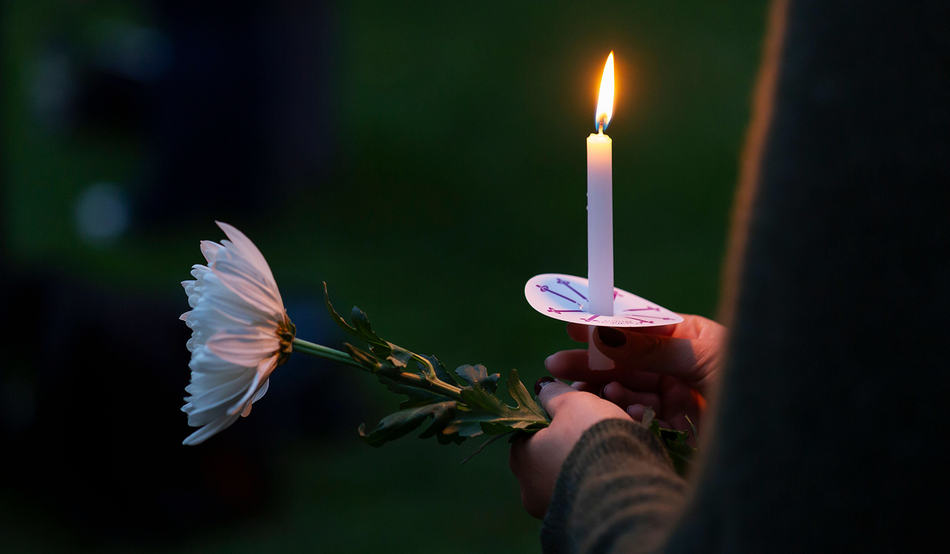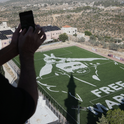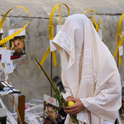In two years everything can break. All norms, all decency. In two years you can take a big idea, like shared humanity or international law, and empty it of all meaning.
Such as when, on that Saturday morning two years ago, the attack which became a massacre started. People watched clips of the violence on their phones, and it wasn’t immediately obvious to everyone that all such violence should be rejected. It was as if, for some, the brutality was theoretical, or a thing happening elsewhere, to be discussed in pithy social media posts about decolonisation or history, rather than the murder in cold blood of human beings.
Such as when, having led his country to ruin, having neglected his duty to protect people who were in their homes or out dancing, a leader vowed to unleash vengeance in return. Such as when, in those first days, a war—which he later framed biblically with reference to Amalek, the enemy of the Israelites—had already killed hundreds of people, but had not released a single person ripped from safety on that Saturday. Such as how, from the beginning, there were those who saw in this horror—which was planned, strategic, opportunistic—an opportunity for themselves or the fulfilment of their own messianic dreams.
In two years, even numbers can be emptied of all meaning. What does it mean to kill at least 67,000 people? What does it mean to wound more than 169,000? What does it mean to have killed nearly 20,000 Palestinian children? These numbers are unthinkable, ungrippable. What does it mean that, on the day that this particular chapter in a bloody history began, 1,200 mostly civilians, women, children, the elderly, were killed? What does it mean that 48 hostages are in Gaza, most of them thought to be already dead? You can’t measure the scope of the abandonment when your government has not really been fighting for you. Or when those who lead you take a long-calculated risk that involves your annihilation. And every life is a universe.
You might hope that two years is long enough to reclaim the shared humanity that has been lost. Or to look around at all the destruction and death and realise that, humanity aside, this does not make any kind of sense. That watching two years of live-streamed, deliberate brutality has damaged our souls. That in these two years we have entered an era of political violence, and that this is part of its landscape. That refusing to empathise with a human being brutalised is to be complicit in brutality. That still, after two years, we don’t have a good answer to how to stop this in the long term, or to what happens next.
Two years is certainly not long enough to grieve when the thing itself is still occurring. Can anyone hold the pain of Palestinians and Israelis, and of Jews? The grief takes different directions and the differences, the enmities, entrench further. A small minority vocalises the fact that everybody’s pain is real. They see the victimisation of a population trapped in Gaza, which can’t escape, after a government called for vengeance and duly meted it out, in what many believe is genocide. They see the families wiped out, others displaced, dispossessed. They also see a population being brutalised and displaced in the West Bank. They see, too, those people who were taken from their homes in southern Israel still being held two years later, now only skin and bones. They remember the others murdered, maimed, assaulted that day. They see real fear among the peoples living this reality, and they believe it.
But most of us compartmentalise it all, because how are you supposed to think with these truths all at once?
We are living in dark times. Everybody says so. How do you live in such darkness? Some do it by insisting that reality is simple to parse. So Amichai Chikli, the diaspora affairs minister of Israel, invites Tommy Robinson to visit in the wake of the Manchester synagogue attack. Chikli is an opportunist, yes, but he is also someone who believes the story here is of Muslims against Jews, or Muslims against western civilisation. He thinks the likes of Tommy Robinson are on his side. This idea is simpler, easier, than the truth.
There are still others who believe that good vs evil is the right template, but that its contours lie elsewhere. They believe the truth is found in Israel’s badness. Maybe they even believe, whether they realise it or not, that more than anything this is a story about something bad that is innate in Jews.
That terrible Saturday a policy of not having a policy, of kicking cans down roads, of refusing to face reality and see dangers where they lurked, resulted in wanton destruction, which has yet to stop. These two years have been so long one hardly dares believe that they could end. For two whole years we have watched, seemingly helpless, as so little has been done and words, shouted in opposition, have been rendered silent. Perhaps two years is what it takes to realise that no one is coming to save you.













